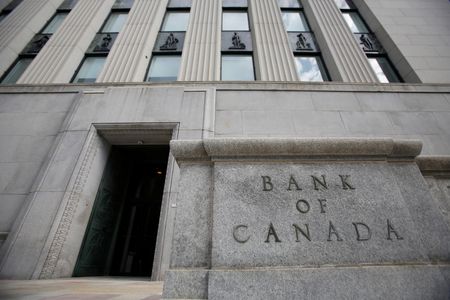 1
1 1
1
By Steve Scherer and Ismail Shakil
OTTAWA (Reuters) – The Bank of Canada (BoC) did not hike interest rates earlier this month because it wanted to wait for more evidence of the effects of previous monetary tightening on growth and inflation, according to minutes from the policy-setting meeting released on Wednesday.
On April 12, the central bank left its key overnight interest rate on hold at 4.50% for a second time in a row but struck a hawkish tone, playing down market expectations for a cut this year as the risk of a recession diminished.
The minutes showed that the six members of the governing council noted that growth had been more robust than had been forecast in January, and that they were concerned that lowering inflation toward its 2% target in the second half of this year could be difficult.
“The case to maintain the policy rate at 4.50% reflected Governing Council’s view that headline inflation is coming down quickly in line with the Bank’s forecast and that more evidence would be needed to assess whether monetary policy was sufficiently restrictive,” the minutes said.
Inflation peaked at 8.1% last year and reached 4.3% in March.
“One thing is for sure: central bankers want Canadians to know that, if rates are to move in the coming months, it’s far more likely that they move higher than lower,” said Royce Mendes, head of macro strategy at Desjardins Group, in a note.
The BoC last month became the world’s first major central bank to pause its tightening campaign.
The BoC sees inflation falling to 3% this summer, but it has said getting to 2% may take time as services costs are proving sticky and wages continue to grow, in part because of a tight labor market and better-than-expected growth in the first quarter.
“Governing Council acknowledged that the labor market was still tight and the slowing in growth would likely come a little later,” the minutes said. “Governing Council agreed that … there was a sense that the economy was proving a little stronger than expected.”
After leaving rates on hold this month, the BoC also said it would need to stay restrictive for longer, and that money market expectations at the time for a cut later this year was not the “most likely scenario.”
Canadian inflation excluding food and energy costs is expected to remain above 3% until the fourth quarter of this year.
(Reporting by Steve Scherer and Ismail Shakil; Editing by Mark Porter and Lisa Shumaker)